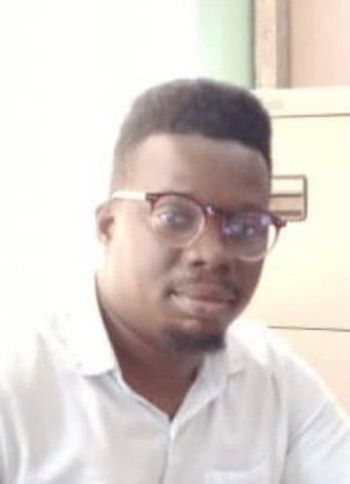Newman Anthony Levey

Summary: Newman Anthony Levey is a local journalist based in Bo, southern Sierra Leone. He has reported on issues of alleged ritual killings, corruption, and human rights abuses in Sierra Leone. Levey is a fearless reporter who succeeds despite the challenges; he has been threatened and verbally attacked, but he continues to risk his physical, financial, and emotional well-being to speak up.
Profile: Politico Newspaper reporter and journalist Newman Anthony Levey was inspired by the work of the late BBC Resident Reporter Prince Braima, who reported for the BBC during Sierra Leone’s decade of civil unrest.
Levey grew up in Sierra Leone’s southern city of Bo. He was a fervent listener of radio stations, including Kiss 104 FM, SLBC 96.5FM, and the BBC. After completing secondary school, Levey volunteered as a student reporter at SLBC. That is where he learned the basics of journalism, particularly on the program called “Focus on Youth”. After years of volunteering, Levey left after failing to secure a permanent spot. In 2008, after graduating from Njala University, he joined southern Sierra Leone’s SMILE Radio 89.9FM as a reporter. Levey believed that a consistent and sober voice was urgently needed to continue to speak up for his people in that part of the country.
Levey believed that the well-being of people living in the south of Sierra Leone was chaotic and needed urgent and focused attention by the state, especially considering the issues bordering on allegations of ritual killings. Since 2016, Levey’s work in southern Sierra Leone, notably his “Current Affairs Show”, has provided a platform for citizens to speak freely on issues affecting them.
Over the years, Levey has reported on more than 50 incidences of injustice, human rights violations, and academic bottlenecks. In 2017, during one of his phone-in sessions, Levey received endless calls from locals in the Bo District’s Valunya Chiefdom about alleged rituals involving the struggles of chieftains. Levey decided to publicize the issue, even though it made Margaret Bannie, the Paramount Chief of the Valunya Chiefdom, very uneasy.
Levey made it his goal to investigate and bring to the forefront issues of concern to common citizens. After securing a position with the Politico newspaper, he looked into the Sierra Leone Water Company (SALWACO) because of the water shortage in Bo. His story was captioned “Bo Town Goes Three Months without Water Supply”, and that drew attention to the efficacy of the SALWACO in the Bo District. After that went public, Levey was verbally attacked by the manager of SALWACO in Bo District, who accused him of attempting to get him fired.
Levey also investigated the death of a teenage boy in the Bo District. The boy had been accused of theft by an elderly man and suffered “mob justice” at the hands of two locals. The boy eventually died. Levey took up the story and called out the perpetrators. One was arrested and detained; the other escaped. And Levey delved into issues of administrative delays in students’ paying school fees to Njala University. He was troubled by the delay in paying fees through a single outlet, which culminated in long queues and students missing lectures. His reporting led to the University’s opening new outlets to ease payments.
Newman Anthony Levey has tried hard to get decision-makers to address the issues he raises, as well as to provide justice for victims. He has also countered “reforms” that don’t align with the welfare and aspirations of his people. These efforts have sometimes brought about negative consequences, including threats to his well-being.
“In this part of the globe,” he says, “people don’t want us to talk about anything. . . . We need to make a change, and if I don’t do it, who else will?”
And he’s not going to stop anytime soon: “I want to do my work to the best of my ability, with my conscience and without malice.”
